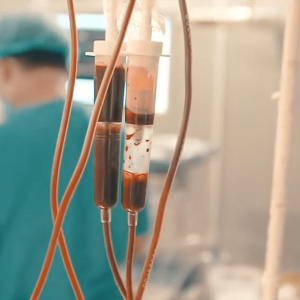Gastrointestinal (GI) Bleeding
Acute gastrointestinal (GI) bleeding is an important cause of mortality worldwide
Bleeding can occur from the upper or lower GI tract, with upper GI bleeding accounting for most cases
The main causes include peptic ulcer/erosive mucosal disease, oesophageal varices, and malignancy – the case fatality rate is around 10% for upper GI bleeding and 3% for lower GI bleeding, with rebleeding effecting 5-40% of patients and is associated with a four-fold increased risk of death
Research Overview
HALT-IT Trial: TXA for GI bleeding?
The HALT-IT trial assessed whether early administration of tranexamic acid (TXA) in participants with acute GI bleeding can reduce their risk of dying in the hospital.
This trial began recruitment in 2013 and ended in 2019, during this time 12,000 patients were recruited from hospitals worldwide and randomly assigned to receive either TXA or placebo.
The trial investigated the effects of 4 grams of TXA infused over 24-h on death, thromboembolic events and other complications in patients with acute GI bleeding.
GI bleeding is a common emergency with a 10-15% death rate. An effective treatment could save thousands of lives worldwide.
However, the HALT-IT trial results found that TXA does not reduce deaths from gastrointestinal bleeding and showed an increased risk of thromboembolic events (deep vein thrombosis or pulmonary embolism). There were also more seizures with TXA.
On the basis of these results, TXA should not be used for the treatment of GI bleeding outside the context of a randomised trial.
More Resources
Click on watch, read or teach to access videos, publications, and training materials
![]() HALT-IT Trial: Scientific Overview
HALT-IT Trial: Scientific Overview
This video explains the rationale and the importance of the trial
![]() HALT-IT Trial: Training Video
HALT-IT Trial: Training Video
This video describes the trial procedures
![]() HALT-IT: The Resus Room
HALT-IT: The Resus Room
Listen to the Resus Room podcast discussion of the HALT-IT trial results here
![]() HALT-IT Trial: Emergency Medicine Abstracts (EMA)
HALT-IT Trial: Emergency Medicine Abstracts (EMA)
Listen to Emergency Medicine Reviews and Perspectives EMA episode discuss the HALT-IT trial results here
![]() HALT-IT: Trial Results (Lancet)
HALT-IT: Trial Results (Lancet)
Effects of a high-dose 24-h infusion of tranexamic acid on death and thromboembolic events in patients with acute gastrointestinal bleeding (HALT-IT): an international randomised, double-blind, placebo-controlled trial
View PDF
![]() HALT-IT: The need for evidence we can trust
HALT-IT: The need for evidence we can trust
Lead author of the HALT-IT trial Ian Roberts on why he believes the trial findings reinforce why the knowledge system for healthcare is not fit for purpose
Read here
![]() HALT-IT: The case of gastrointestinal bleeding
HALT-IT: The case of gastrointestinal bleeding
Extending evidence for the use of tranexamic acid from traumatic haemorrhage to other patients with major bleeding: do we need more than one haemorrhage protocol? The case of gastrointestinal bleeding
View PDF
![]() HALT-IT: Commentary
HALT-IT: Commentary
Outcome measures in clinical trials of treatments for acute severe haemorrhage
View PDF
![]() HALT-IT: TXA Meta-analysis
HALT-IT: TXA Meta-analysis
Effect of treatment delay on the effectiveness and safety of antifibrinolytics in acute severe haemorrhage: a meta-analysis of individual patient-level data from 40 138 bleeding patients
View PDF
![]() HALT-IT: During the trial
HALT-IT: During the trial
Update On The Halt-it Trial Progress
View PDF
![]() HALT-IT Trial: Results Presentation
HALT-IT Trial: Results Presentation
![]() HALT-IT Trial: Protocol
HALT-IT Trial: Protocol
TXA for the treatment of gastrointestinal bleeding: study protocol for a randomised controlled trial
View PDF
![]() HALT-IT Trial: Statistical Analysis
HALT-IT Trial: Statistical Analysis
Statistical analysis plan for an international, randomised, double-blind, placebo-controlled trial
View PDF
![]() HALT-IT Trial: Uncertainties
HALT-IT Trial: Uncertainties
How effective is tranexamic acid for acute gastrointestinal bleeding?
View PDF
![]() Gastrointestinal Bleeding and the HALT-IT Trial
Gastrointestinal Bleeding and the HALT-IT Trial
A presentation detailing why we conducted the HALT-IT trial, and a summary of the trial design
View PDF
More Treatments
TXAcentral is a resource for health professionals caring for people with acute bleeding
TXAcentral brings together randomised trial evidence on the effectiveness and safety of tranexamic acid
Data on many of the trials are also available at the freeBIRD website
In trauma patients with significant bleeding and those with traumatic brain injury (TBI), TXA has been shown to reduce mortality in both extracranial and intracranial bleeding
Postpartum Haemorrhage (PPH) is the leading cause of maternal death worldwide, responsible for around 100 000 deaths each year. TXA given as quickly as possible after birth and no later than 3 hours, reduces death due to bleeding and the need for surgery to stop bleeding
GI Bleeding is a common emergency that causes substantial mortality and morbidity worldwide. TXA was found to not reduce deaths from GI bleeding and showed an increased risk of thromboembolic events
Every year there are over 300 million surgical procedures worldwide. Bleeding is an important complication and many patients require a blood transfusion. TXA reduces blood loss in surgical patients by about one‐third. However, the effects of TXA on thromboembolic events and mortality in surgery are uncertain
There is ongoing research looking at how Tranexamic Acid (TXA) could be utilised for other bleeding conditions





